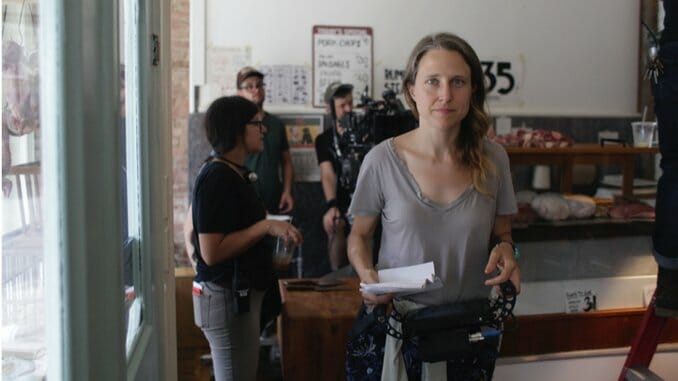Josephine Decker on Finding Power in the Fictional Shirley Jackson

One would be hard-pressed to find an American filmmaker better suited than Josephine Decker for zeroing in on the innate power dynamics of Shirley, an adaptation of the Susan Scarf Merrell’s fictionalized account of the period in Shirley Jackson’s life in which she wrote Hangsaman. Decker has, for most of her career, made a study of the power dynamics between women, whether in Butter on the Latch or 2018’s Madeline’s Madeline, making occasional pit stops to explore sexual depravity in films like Thou Wast Mild and Lovely. In bits and pieces, these are the things that Shirley is made of, both on the page (whether Merrell’s or screenwriter Sarah Gubbins’) and on screen.
Shirley is a trip into psychosexual darkness, befitting of a Jackson story, with Elisabeth Moss playing the great writer herself and Odessa Young playing Rosie, the girl and pregnant mother-to-be staying in her home for a couple seasons with her husband, Fred (Logan Lerman), and Jackson’s husband, Stanley Hyman (Michael Stuhlbarg). Games of intolerable cruelty commence, between Shirley and Rosie and between Fred and Stanley, though Decker’s focus is the former rather than the latter.
In a discussion with Paste, Decker elaborated on the mechanics of the film and how the performances of Moss and Young provide Shirley’s heart and soul.
Paste Magazine: So this is a bit of a Russian nesting doll movie. You directed the movie, written by Sarah Gubbins, that’s based on the novel by Susan Scarf Merrell, that’s based on the time in Shirley Jackson’s life when she wrote Hangsaman, which is based on the disappearance of Paula Jean Welden. Reading the screenplay and knowing the story, how did you figure out how you’re going to fit your movie into that nesting doll?
Josephine Decker: I just tried to focus on the script that Sarah had written, and really look at that as its own piece, its own story, as much as we were trying to do an adaptation and also trying to be inspired by Shirley’s work and her life. We did a ton of research, obviously, to prepare, but the most important thing was staying connected to the story that we’re telling for these 90 to 100 minutes, and making sure that that story really sings. Sarah and I spent about a year working on the script, just kind of playing with it a bit together and trying to make even more cohesion and connection between our main characters.
There’s so much to play with, and there’s so much in Susan’s novel about this connection between these two women that is also so apparent in all of Shirley’s writing. There’s always this one woman who’s good at life, and one woman who’s maybe not so good as life [laughs], and they became very close friends. Playing with that—these two sides of one single consciousness almost—was really fun.
Paste: I’m reading the novel and in it there’s this undercurrent of love that Rosie has for Natalie, and a more expressed love I think for Shirley. This is complimentary, but I feel like that’s been voided in the movie and replaced almost by a latent eroticism. Rosie reads “The Lottery” at the beginning and then goes, “I want to have sex with my husband on a train.” It feels like you wanted to get more explicit about how Rosie and Shirley connect outside of other relationships in the movie?
-

-

-

-

-

-

-

-

-

-

-

-

-

-

-

-

-

-

-

-

-

-

-

-

-

-

-

-

-

-

-

-

-

-

-

-

-

-

-

-








































